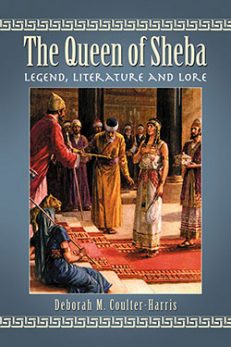The Queen of Sheba
Legend, Literature and Lore
$29.95
In stock
About the Book
Part I of this book begins with a scriptural study of all Sheba references, particularly the origins and genealogy of the name and its connections with Hebrew patriarchs such as Abraham and kings Saul and David; it later explores the literature and legends surrounding king Solomon and his trade negotiations with Sheba. The text analyzes theories and links between the Queen of Sheba and Pharaoh Hatshepsut, and concludes that Sheba may well be the Pharaoh based upon linguistic associations and the related stories from a multitude of regions and countries. Part II travels into ancient Arabian, Yemeni, Ethiopian, and Eritrean tales of the Queen of Sheba, and examines the mention of Sheba in an array of Jewish, Christian, and Muslim texts. It scrutinizes associations between ancient gods and pharaohs, particularly the similarity of their iconographic representations, the meaning of their symbols and signs that connect with Sheba legends and Hatshepsut’s history, the real extent and location of her vast empire.
About the Author(s)
Bibliographic Details
Deborah M. Coulter-Harris
Format: softcover (6 x 9)
Pages: 208
Bibliographic Info: appendices, notes, bibliography, index
Copyright Date: 2013
pISBN: 978-0-7864-6969-7
eISBN: 978-1-4766-0099-4
Imprint: McFarland
Table of Contents
Preface 1
Introducing the Legend 5
Part I : Genealogy, History and Religious Associations
1. Origin and Genealogy of the Name “Sheba” in Hebrew Scriptures 13
2. Identification Controversy: Is the Queen of Sheba Pharaoh Hatshepsut? 26
3. Gods and Goddesses: Continuing Clues to Sheba’s Identity 39
4. Sheba as Iconic Archetype of Mother Goddess 60
5. Solomon: Supernatural King, Lover and Builder 75
6. International Competing Moguls 90
Part II : Literature: Sheba, Everyone’s Queen
7. Jewish and Christian Accounts of Sheba 105
8. Qur’anic and Assorted Arabian Legends 121
9. Ethiopian Legends: Ancestral Claims and Political Dominance 135
10. Final Assessment 149
Appendix A. Varied Names of the Queen of Sheba 173
Appendix B. Names and Relationships of the Four Most Important Sumerian Deities 174
Chapter Notes 176
Bibliography 187
Index 197
Book Reviews & Awards
“Coulter-Harris examines the religious and secular legends, literature, and lore surrounding the Queen of Sheba”—Reference & Research Book News.






